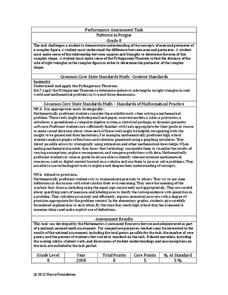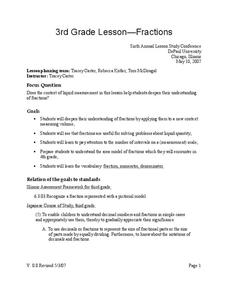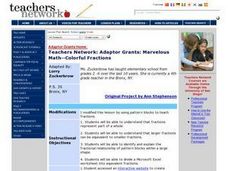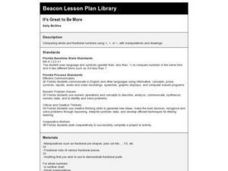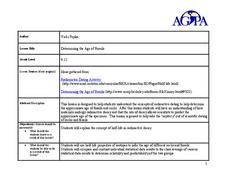Inside Mathematics
Patterns in Prague
Designers in Prague are not diagonally challenged. The mini-assessment provides a complex pattern made from blocks. Individuals use the pattern to find the area and perimeter of the design. To find the perimeter, they use the Pythagorean...
Vita Education Services
Past Continuous Game
Your pupils were studying the past continuous when you realized that they could benefit from this game! Learners roll a die and complete the sentence they land on. They will have a chance to begin and end sentences.
DiscoverE
Marble Run
It's time to slow your roll! Can your class create a track that allows a marble to roll as slowly as possible? Teams of science scholars collaborate to design, build, and test their tubes while learning about gravity and friction.
National Institute of Open Schooling
Hydrocarbons
The vast majority of hydrocarbons humans use help fuel cars, homes, and provide energy. A comprehensive lesson teaches pupils all about hydrocarbons. From alkanes, alkenes, and alkynes to benzene, classes study the preparation of these...
Curated OER
Fantastic Fractions
Students work in small groups to find pictures that represent the fractions 1/2, 1/3, and 1/4. They paste their examples onto bulletin board paper and share their results with the rest of the class.
Curated OER
Fractions
Students practice measurement. In this fractions lesson, 6th graders measure volume of a liquid, e.g. 1/5 liter, and learn the vocabulary of fractions (numerator, denominator). Students solve sample problems in small...
Curated OER
Marvelous Math -- Colorful Fractions
Students begin the lesson by discovering that a fraction is one part of a whole. In groups, they practice reducting larger fractions into small fractions and discovering they are equal. They use blocks to identify the relationship...
Curated OER
Fractions and Fact Families: Jump Kangaroo Jump!
Second graders practice with fractions and fact families. In this fractions and fact families lesson, 2nd graders participate in a series of activities to assist them with understanding fractions. Activities include graphing,...
Curated OER
It's Great to Be More
Students compare whole and fractional numbers using <, >, or =, with manipulatives and drawings.
Curated OER
Hands-on Cells
Young scholars review the components of a cell and the differences between plant and animal cells by creating a three-dimensional model of each type of cell. In small groups, they use modeling clay and household object to construct their...
Curated OER
Developing Grammar
Students work on grammar with annual events and past tenses respectively. They drill and practice independently and in small groups. Students' extend their linguistic precision when talking about their lives.
Curated OER
Personal Opinions, Part 2
Students create questions for an interview about the environment. They interview a peer using their written questions, and then interview a native Spanish speaker about the environment.
Curated OER
Voting and the U.S. Constitution (Past, Present, and Future), Part 2
Students analyze and discuss the 19th Amendment, and read the document, Why Women Want to Vote. Students illustrate statements from the handbill, then conduct a play about women's suffrage.
Curated OER
Fractions
Second graders, while in the computer lab discuss Fraction Action by Loreen Leedy, practice solving problems involving fractions. They explore non-unit fractions by describing parts of a set utilizing their attributes to categorize the...
Curated OER
Determining the Age of Fossils
High schoolers examine the concept of radioactive dating. In this radioactive dating lesson, students investigate how to determine the ages of fossils and rocks as they learn about half-life radioactive decay.
Curated OER
Using Decimals and Fractions to Count Classmates
In this using decimals and fractions to count classmates worksheet, 5th graders use data from classmates to figure out decimal and fraction ratios.
Curated OER
Similar And Different
High schoolers take part in a lesson that is composed of team building activities. They work in small groups in order to interview others to find information to point out similarities or differences. Students then take part in class...
Curated OER
Numerator and Denominator
Students identify the numerator and denominator of a fraction.
Curated OER
Who Needs It?
Fourth graders explain the needs and wants of an Abenaki family or group and/or of a family or group in the first half of the 19th century and compare them to the needs and wants of Students' family or household today.
Curated OER
Introduction to Fractions
Fourth graders break into groups having 10 come to the front and figure out the fraction of students are wearing jeans, glasses, have brown hair, etc. They write the fraction together. Each student then makes a picture and be able to...
Curated OER
How the West was Won? Conflict and Change on the Western Frontier
Seventh graders assess the conflict and change that occurred in the westward expansion following the Civil War. They list specific reasons why different groups moved west and the interaction between the "white" European civilization and...
Curated OER
Fractions: Multiplication and Division
Seventh graders multiply and divide fractions. Using the teepee method, 7th graders model fractions as they find solutions to problems. They recognize that "of" means to multiply and explore real life situations when multiplying or...
Curated OER
Geometry: Practical Applications of the Distance Formula
Students, working independently and in groups, apply the distance formula to practical situations. After solving various problems, students in pairs design coordinate planes from the school blue print to measure the distance from the...
Curated OER
Something's Fishy
Students study fish habits and traits. In this marine life lesson, students complete four learning centers of a fish memory game, a fish habitat study, draw and glue fish craft activity, and a fish read-a-thon. Students complete their...
